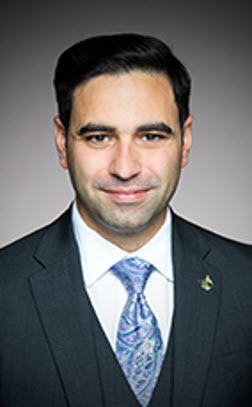Appearance before the Standing Committee on Public Accounts on Report 12: Protecting Canada's Food System, March 1, 2022
Table of contents
Scenario Note
Logistics
Date: Tuesday, March 01, 2022
Time: 11:00 a.m. to 1:00 p.m.
Location: Videoconference (Zoom)
Subject: OAG Report 12 – Protecting Canada's Food System
Appearing From Various Government Departments
Office of the Auditor General of Canada
Andrew Hayes, Deputy Auditor General
Kimberley Leach, Principal
James Reinhart, Director
Crown-Indigenous Relations and Northern Affairs Canada
Daniel Quan-Watson, Deputy Minister
Paula Isaak, Associate Deputy Minister
Wayne Walsh, Director General, Northern Strategic Policy
Agri-Food and Agriculture Canada
Chris Forbes, Deputy Minister
Fisheries and Oceans Canada
Timothy Sargent, Deputy Minister
Niall O'Dea, Senior Assistant Deputy Minister, Strategic Policy
Hugo Page, Assistant Deputy Minister & Chief Financial Officer
Canada Economic Development for Quebec Regions
Manon Brassard, President
Marie-Claude Petit, Assistant Deputy Minister
Pacific Economic Development Canada
Dylan Jones, Deputy Minister
Naina Sloan, Vice-President of Programs and Partners
Atlantic Canada Opportunities Agency
Francis McGuire, President
Background
The Standing Committee on Public Accounts is chaired by the Opposition. Government policy, and the extent to which policy objectives are achieved, are generally not examined by the Public Accounts Committee. Instead, the Committee focuses on government administration – the economy and efficiency of program delivery as well as the adherence to government policies, directives and standards. The Committee seeks to hold the government to account for effective public administration and due regard for public funds.
Context on Committee Members
It should be noted that most of the members are new MPs and new to the Committee. The three MPs who have sat on PACP previously are Philippe Lawrence (Lib) and Jean Yip (Lib) and Brenda Shanahan (Lib).
While the members of the Committee have not been particularly vocal on food security in the North, some of them have raised interests in Indigenous issues. For example, in terms of some of the Conservative members, Tom Kmiec pressed the Government during Question Period to support the Teck Frontier project in Alberta, stating "if reconciliation with First Nations means something, surely it means saying yes to economic development for Indigenous peoples." (February 6, 2020). Philip Lawrence has spoken out about the need for more action to address mental health for Indigenous peoples (Hansard, December 10, 2020). Richard Bragdon has not been vocal on Indigenous issues, but he has expressed views on agricultural producers who are "the backbone of our economy and are essential to our food security." He said it's important to prioritize agriculture and food chains and make proper investments in agriculture. (June 18, 2021).
In terms of some of the Liberal members, Valerie Bradford has referenced the Anishnabeg Outreach centre in her riding of Kitchener South, which has provided healing and employment opportunities to friendship centres. She applauded the centre for its work on reconciliation in helping people heal from the legacy of residential schools. (Hansard, January 31, 2022) Han Dong has spoken out about Indigenous people being overrepresented in the homeless population, and has raised questions on whether the current housing stock is adequate. (Standing Committee on Human Resources, Skills and Social Development and the Status of Persons with Disabilities, January 28, 2021) Jean Yip has expressed concerns with the high number of Indigenous women who are incarcerated (Standing Committee on Public Accounts, April 17, 2018).
Blake Desjarlais (NDP) is Indigenous, born in Edmonton and raised in the Fishing Lake Métis Settlement. He has expressed concerns about racism against Muslims and has retweeted messages regarding burial grounds at residential school sites (Twitter January 28, 2022). At the PACP meeting held on February 8, 2022, on "Lessons Learned from Canada's Record on Climate Change" he indicated that the Government has not been consulting with Indigenous workers in his constituency in Alberta regarding a transition to lower Greenhouse Gas Emissions' from intensive industrial practices.
Nathalie Sinclair-Desgagné (BQ) has been vocal in her advocacy for Québec-related issues. For example, she has spoken out about tourism and hospitality, culture, and seniors. As an associate member for the Finance Committee, she has spoken about the increased delay in funding for the cultural sector and small business owners. Additionally, the member has often discussed inflation and the impact on businesses, tourism, and culture. When discussing An Act to Provide Further Support in Response to COVID-19, the member highlighted how cultural workers are not included in the Bill, which she considers a shortcoming.
Meeting Proceedings
The meeting is scheduled from 11:00 a.m. and 1:00 p.m. via the web platform Zoom. While the speaking order is to be confirmed, it is likely that the Auditor General will deliver remarks first, with remarks following from the other government departments and organizations.
All witnesses will be asked to connect to the meeting at 10:30 a.m. The Zoom link will be sent directly from the House of Commons to the witnesses.
The Chair will open the meeting and provide instructions for the meeting proceedings. He will then introduce all witnesses. The DM will deliver his remarks as per standard practice (5 minute maximum). It is recommended to speak slowly and at an appropriate level to ensure the interpreters can hear you. All witnesses are requested to mute their microphone when they are not speaking.
While simultaneous translation will be available, witnesses are asked to respond to questions in either English or French, but to limit switching back and forth between languages as this often creates technology/interpretation challenges.
Following the opening remarks, there will be rounds of questions from Committee members (as listed below).
Committee members will pose their questions in the following order:
- First round (6 minutes for each Party)
- Conservative Party of Canada
- Liberal Party of Canada
- Bloc Québécois
- New Democratic Party of Canada
- Second and subsequent rounds, the order and time for questioning will be as follows:
- Conservative Party of Canada (5 minutes)
- Liberal Party of Canada (5 minutes)
- Bloc Québécois (2.5 minutes)
- New Democratic Party of Canada (2.5 minutes)
- Conservative Party of Canada (5 minutes)
- Liberal Party of Canada (5 minutes)
The meeting can be watched via Parlvu, however there is a 70-second delay: https://parlvu.parl.gc.ca/Harmony.
Opening Remarks
Opening Remarks by DM Daniel Quan-Watson
May I start off, Mr. Chair, by congratulating you on your election today.
I'd like to acknowledge that I'm located on Treaty 6 territory, a traditional meeting ground and home for many indigenous peoples including Cree, Saulteaux, Niitsitapi, Blackfoot, Métis and Nakota Sioux peoples.
Access to healthy and affordable food has been an issue for too many isolated and indigenous communities in the north. Food insecurity is a drain on individuals and communities, saps away at the spirit, and is a roadblock towards development.
This department is working hard with partners to put in place measures to improve both the accessibility and affordability of nutritious food and other essential household items in northern and indigenous communities.
One of the programs we have developed to help address these challenges is the nutrition north Canada retail subsidy program.
CIRNAC officials have been in regular contact with indigenous and northern partners and the nutrition north advisory board, which comprises members who have extensive experience living and working across nutrition north Canada's delivery area, to understand and address their immediate and long-term food security concerns.
Nutrition north Canada programming is also directly informed by two working groups – the indigenous working group and the inuit-Crown food security working group, both of which ensure that northern indigenous and community perspectives are heard and considered.
We have also held ongoing discussions with territorial governments and other federal departments on collaborative long-term solutions towards food security. The Auditor General recommended that the department collect pricing data on pre-subsidy food items so that the program can show if it is meeting its objective of making food more affordable.
We agree with this recommendation and we have taken it to heart.
We've committed to working with registered retailers to collect pre-subsidy prices for eligible items. The program will also review and amend agreements with all retailers to require that pre-subsidy prices be submitted with monthly subsidy claims. We will make the results public on the CIRNAC website.
As the Auditor General's report highlights, the program increased access and, where data was available, affordability of nutritious food and essential household items to residents in isolated northern communities during the pandemic.
I can give you some examples. In June 2021, in Iqaluit, Nunavut, the impact of the increased retail subsidy can be seen in items such as these. A dozen eggs cost $7.05 before the subsidy and $4.29 after. Five pounds of fresh carrots was $16.13 before the subsidy and $7.99 after. We can show items that are now more accessible to northerners due to increased shipping volumes. For example, in 2021 over 42 million kilograms of subsidized food and essential items were shipped to isolated northern communities. This represents an increase of roughly 10 million kilograms or 30% over the previous year.
These examples show that the program has been successful in both making food and essential items more accessible and more affordable in the North.
The Government of Canada will continue working with partners to ensure that healthy food is available in northern and indigenous communities.
I look forward to any questions you may have.
Overview of Report 12: Protecting Canada's Food System
This report presents the results of a performance audit conducted by the Office of the Auditor General of Canada (OAG) under the authority of the Auditor General Act. The report was tabled in the House of Commons on December 9, 2021 and is publically available on the OAG website.
The objective of this audit was to determine whether selected departments and agencies protected Canada's food system during the COVID‑19 pandemic by effectively designing, delivering, and managing programs to reduce food insecurity in Canada and to support the resilience of food processors in the agriculture and agri-food and the fish and seafood sectors.
This audit work focused on 5 initiatives that formed part of the government's response to the COVID 19 pandemic:
- the Canadian Seafood Stabilization Fund, implemented by Fisheries and Oceans Canada and delivered by the Atlantic Canada Opportunities Agency, Canada Economic Development for Quebec Regions, and the former Western Economic Diversification Canada (which became 2 new agencies in August 2021: Pacific Economic Development Canada and Prairies Economic Development Canada)
- the Emergency Processing Fund, implemented by Agriculture and Agri Food Canada
- the Emergency Food Security Fund, implemented by Agriculture and Agri Food Canada
- the Surplus Food Rescue Program, implemented by Agriculture and Agri Food Canada
- the Nutrition North Canada subsidy program, implemented by Crown-Indigenous Relations and Northern Affairs Canada
In the audit work on the design of the emergency programming, the OAG examined whether:
- the funding aligned with federal priorities for emergency management as well as Canada's commitments to sustainable development and food-related policies and strategies;
- there were documented processes for the identification of eligible recipients and initiatives;
- there was engagement with stakeholders; and
- there was due consideration of gender and diversity
OAG conclusions (All departments)
OAG concluded that the emergency initiatives audited had helped to mitigate some effects of the COVID‑19 pandemic on elements of Canada's food system. However, problems with data and performance measurement meant that the departments and agencies audited did not know whether the initiatives had achieved all of their outcomes for reducing food insecurity or supporting the resilience of food processors in the agriculture and agri-food and the fish and seafood sectors.
OAG concluded that the responsible departments and agencies had many of the oversight controls in place for the delivery of the emergency food programs. However, Agriculture and Agri‑Food Canada did not follow 2 key steps of the application assessment process for 1 of its programs. Also, there were some inconsistencies in program design across 3 of the initiatives that were examined, which led to unfairness for applicants and recipients across regions.
OAG also concluded that there was no national emergency preparedness and response plan for Canada's food system and food security, despite the government having identified food as a critical infrastructure sector long before the COVID‑19 pandemic began. While Agriculture and Agri‑Food Canada had 2 emergency plans in place, it acknowledged that they were insufficient to deal with a crisis of this magnitude. Nevertheless, the responsible departments and agencies drew on existing programs and mechanisms to expedite the creation of the new emergency food programs that we examined.
OAG overall findings & recommendations (Impacting CIRNAC only)
Lack of data on pre‑subsidy food prices from Crown-Indigenous Relations and Northern Affairs Canada
Recommendation. Crown-Indigenous Relations and Northern Affairs Canada should systematically collect pre‑subsidy prices for all eligible food items under the Nutrition North Canada subsidy program, to allow assessment of the extent to which the program is achieving its objective of making food more affordable in the eligible communities.
Other OAG findings which implicate CIRNAC with no OAG recommendation
Paragraph 32: Crown-Indigenous Relations and Northern Affairs Canada did not conduct consultations with stakeholders to identify specific needs and priorities of northern and remote communities in response to the pandemic, or on how best to use the $25 million that the Nutrition North Canada subsidy program received.
Paragraph 81: Crown-Indigenous Relations and Northern Affairs Canada's Nutrition North Canada subsidy program has the dual outcomes of making food more accessible and more affordable in remote and isolated communities. To achieve these outcomes, the department applies subsidies to food items at low, medium, and high rates. The rates vary by eligible community. The additional COVID‑19 funding allocated to the Nutrition North Canada subsidy program applied to items subsidized only at medium and high rates. We found that the department had sufficient data to demonstrate progress on its outcome related to accessibility but not on its outcome related to affordability.
Paragraph 84: To demonstrate the effect of subsidies on food prices, we obtained pre‑subsidy prices of a few food items in a store in Iqaluit, Nunavut. With this information, the effect of subsidies on food prices can be seen more clearly (Exhibit 12.11).
| Food item and quantity | Prices for June 2021 as shown on pricing labels in a store in Iqaluit, Nunavut | Statistics Canada data for June 2021 | ||
|---|---|---|---|---|
| Pre subsidy price ($) | Post-subsidy price ($) | Post-subsidy price reduction (%) | Average price ($) across the 10 provincesFootnote 1 | |
| Bacon (375 grams) | $8.40 | $7.99 | -4.9% | $6.53Footnote 2 |
| Bananas (1 kilogram) | $6.91 | $3.29 | -52.4% | $1.77 |
| Butter (454 grams) | $8.26 | $6.69 | -19.0% | $5.14 |
| Eggs (1 dozen) | $7.05 | $4.29 | -39.1% | $4.12 |
| Milk (4 litres) | $21.69 | $5.59 | -74.2% | $5.93Footnote 3 |
| Carrots (2.27 kilograms) | $16.13 | $7.99 | -50.5% | $3.89Footnote 4 |
OAG Recommendations and CIRNAC Response
Recommendation (12.87): Crown-Indigenous Relations and Northern Affairs Canada should systematically collect pre‑subsidy prices for all eligible food items under the Nutrition North Canada subsidy program, to allow assessment of the extent to which the program is achieving its objective of making food more affordable in the eligible communities.
Crown-Indigenous Relations and Northern Affairs Canada's Response:
Agreed. For the Nutrition North Canada subsidy program, Crown-Indigenous Relations and Northern Affairs Canada commits to working directly with registered retailers to collect pre-subsidy prices for all eligible items. The department will engage with retailers directly to obtain this new subset of data, working collaboratively on how best to make this transition.
The department will also review and amend the contribution agreements for all retailers to include an additional clause that pre‑subsidy prices are to be submitted to the program with their monthly subsidy claims.
The department's projected timeline to implement this recommendation is 12 months.
Management Action Plan
OAG Recommendation
Crown–Indigenous Relations and Northern Affairs Canada should systematically collect pre-subsidy prices for all eligible food items under the Nutrition North Canada subsidy program to allow assessment of the extent to which the program is achieving its objective of making food more affordable in the eligible communities.
Departmental Response
Agreed. For the Nutrition North Canada retail subsidy program, Crown–Indigenous Relations and Northern Affairs Canada commits to working directly with registered retailers to collect pre-subsidy prices for all eligible items. The Department will engage with retailers directly to obtain this new subset of data, working collaboratively on how best to make this transition.
The Department will also review and amend the contribution agreements for retailers to include an additional clause that pre-subsidy prices are to be submitted to the program with their monthly subsidy claims.
The Department's projected timeline to implement this recommendation is end of fiscal year 2022–2023.
Description of Final Expected Outcome/Result
Registered retailers who currently provide pricing data to the program to collect and submit pre-subsidy prices on all eligible items to the program will be consistent with the data collection and submission clauses as set out in the contribution agreements.
Expected Final Completion Date
March 31, 2023
Key Interim Milestones (Description/Dates)
- Engage with the registered retailers who currently submit pricing data to provide formal written notice of the new requirement to provide pre-subsidy pricing data to the program (Completion Date: April 1, 2022)
- Engage with registered retailers to understand the feasibility and possible challenges in providing additional data (Completion date: July 1, 2022)
- Review the contribution agreement template and amend to include additional clause(s) that outline a recipient's commitment to submitting monthly pre-subsidy pricing data. (Completion Date: April 2022)
- Amend all active contribution agreements to include additional clause(s) related to pre-subsidy data collection. This will apply to program recipients who currently report on pricing. (Completion Date: October 1, 2022)
- Complete necessary changes to IM/IT systems to allow for the import, storage and processing of additional data including the modification of the reporting system (BDS) (Completion Date: December 1, 2022)
- Pre-subsidy data from recipients begins to be reported to the program. (Completion Date: April 1, 2023)
Responsible Organization / Point of Contact
(Name, Position, Tel #)
Stephen Jacobsen, Operations Manager, (819) 210-1736
Media Lines (Questions and Answers)
Issue: Key messages and questions and answers prepared to respond to possible questions related to the Auditor General of Canada's Report on Protecting Canada's Food Systems.
These lines supplement existing Nutrition North Canada messaging should there be questions about the report's findings and recommendations.
Statement
We welcome the Auditor General's report on Protecting Canada's Food Supply. The Government of Canada recognizes the importance of the findings and accepts the recommendations.
Key messages
- As the report notes, the Government of Canada drew on a strong foundation of existing programs and mechanisms to quickly create new emergency food programs, and we engaged broadly with stakeholders across the food sector.
- Circumstances over the past year have led to unprecedented use of the Nutrition North Canada (NNC) retail subsidy program. Since the outset of the pandemic, CIRNAC officials have been in regular contact with its Indigenous and northern partners and the Nutrition North Advisory Board to understand and address their immediate and long-term food security concerns. This is in addition to ongoing discussions with territorial governments and other federal departments on collaborative long-term solutions towards food security.
- CIRNAC will continue to monitor the effects of the $25 million investment and how it impacted access and affordability. While this investment provided immediate support in accessing nutritious foods in 2020-2021, it has also raised awareness about the fundamental need for long-term, collaborative solutions to food security in the North.
- CIRNAC also allocated funding from Budget 2021 to maintain the increased retail subsidy rates throughout the pandemic, in recognition that the heightened need for access to nutritious food and essential items continues.
- As announced through the Budget of 2021, the Government of Canada is investing $163.4 million over three years, starting in 2021-22 to work directly with Indigenous partners, including in Inuit Nunangat, to address food insecurity.
- Nutrition North Canada is a key piece of the federal government's food security response.
- Through hard work and strong support from Nutrition North Canada's Advisory Board, the Indigenous Working Group, the Inuit-Crown Food Security Working Group, and the Harvesters Support Grant recipient organizations, the program continues to improve and expand with made-in-the-North, culturally relevant solutions.
Questions and answers
The report agrees that NNC met its objective to make food more accessible but a lack of data collection on pre-subsidy prices hindered demonstrating affordability. The report recommends that CIRNAC collect pricing data on pre-subsidy food items so that the program can show if it is meeting its objective to make food more affordable. Does CIRNAC agree with this recommendation?
CIRNAC agrees and commits to working with registered retailers to collect pre-subsidy prices for eligible items.
- Update: Since Fall 2021, NNC program officials have been working directly with retailers on a final data format and have begun collecting additional pricing data.
NNC will also review and amend agreements with all retailers to require that pre-subsidy prices be submitted with monthly subsidy claims.
- Update: To respond to this recommendation, NNC has reviewed and updated the retailers' Program Manual to include the new data collecting requirements. Since NNC's agreements with retailers point to the Program Manual for specific terms and conditions, the funding agreements themselves do not need to be amended. Therefore this recommendation can be considered complete.
The department's projected timeline to implement this recommendation is 12 months.
- Update: Changes required to make this data available are underway and expected to completed by April 2023. Results will be made public on the CIRNAC website.
Recent use of the NNC retail subsidy program has been unprecedented. As the report highlights, the program increased access and, where data was available, affordability of nutritious food and essential items to residents in isolated northern communities during the COVID-19 pandemic.
Affordability is demonstrated in the report, where data was available. For example, in June 2021 in Iqaluit, Nunavut, the impact of the increased retail subsidy can be seen in the following items:
- One dozen eggs were $7.05 before the subsidy was applied and $4.29 post-subsidy. The national average price (across 10 provinces) at that time was $4.12.
- 5lbs of fresh carrots were $16.13 before the subsidy was applied and $7.99 post-subsidy. The national average price (across 10 provinces) at that time, for 3 lbs of carrots, was $3.89.
- 454 g of butter was $8.26 before the subsidy was applied and $6.69 post-subsidy. The national average price (across 10 provinces) at that time, for 454 g (2 cups) of butter was $5.14.
Accessibility is demonstrated through increased shipping volumes. For example:
- In 2020-21, over 42 million kg of subsidized food and essential items were shipped to isolated northern communities. This represented an increase of roughly 10 million kg, or 30 percent, from the previous year. It also equals the total net growth of the first 9 years of the program, which was established in 2011.
- Between 2011 and 2021, the average volume of eligible items shipped to northern isolated communities increased by approximately 106 percent. About 285.7 million kilograms of eligible items were subsidized, an average increase of about 4.2 million kilograms annually.
The report also found that CIRNAC, along with the other examined departments did not conduct consultations with stakeholders on needs and priorities on how best to use the funding. Does CIRNAC agree with that finding?
CIRNAC is committed to responding to recommendations from partners and ensuring that food access and affordability be maintained throughout the pandemic, which is why we worked to deploy the $25 million in an immediate manner.
CIRNAC will continue to monitor the effects of the $25 million investment and how it impacted access and affordability. While this investment provided immediate support in accessing nutritious foods in 2020-2021, it has also raised awareness about the fundamental need for long-term, collaborative solutions to food security in the North.
CIRNAC also allocated funding from Budget 2021 to maintain the increased retail subsidy rates throughout the pandemic, in recognition that the heightened need for access to nutritious food and essential items continues.
Since the outset of the pandemic, CIRNAC officials with NNC have been in regular contact with Indigenous and northern partners to understand and address their immediate and long-term food security concerns. Regular discussions are also underway with territorial and provincial governments and other federal departments on collaborative solutions to support ongoing food security.
What partnerships does CIRNAC currently have to help make decisions about the Nutrition North Program?
CIRNAC officials with NNC work collaboratively with Indigenous and community leaders and program partners to improve both the accessibility and affordability of nutritious food and other essential items in eligible northern communities.
NNC programming is directly informed by the Advisory Board which reports to the Minister, and two working groups - the Indigenous Working Group, and the Inuit Crown Food Security Working Group.
- The Nutrition North Canada Indigenous Working Group includes 13 national and regional Indigenous organizations and program officials and works together to co-develop options to help Nutrition North Canada work better for Northerners.
- The Inuit-Crown Food Security Working Group was created to focus on food security and work towards sustainable food systems in Inuit Nunangat.
- The Nutrition North Canada Advisory Board was established to improve program governance and to give residents of isolated communities a direct voice in the program. The Board is actively involved in soliciting input from program users to ensure northern and community perspectives are heard and considered.
In addition, the Harvesters Support Grant recipient network represents a unique strategic partnership, integrating skills and employment training with the Harvesters Support Grant, permitting the development of spin-off opportunities attached to the harvesting economy in each community over time.
What other actions has NNC taken to support food security during the COVID-19 pandemic?
In response to critical priorities identified by territorial governments to prepare for and respond to the COVID-19 pandemic the Government of Canada has provided additional support measures to address the immediate health, economic, and transportation needs of northerners, including:
- an additional $25 million investment to NNC, to increase subsidy rates in all eligible communities. The high subsidy level increased by 50 cents/kg, and the medium subsidy level increased by $1/kg.
- expansion of the list of nutritious food and essential items that are being subsidized by the program. Items like hand sanitizer, cleaning, and personal hygiene products are subsidized in all eligible communities and these subsidies will remain on the expanded list of eligible items because the needs continue.
- working with Indigenous organizations to adapt the Harvesters Support Grant to pandemic support, leveraging provisions in the Terms and Conditions to enable special projects that support community isolation efforts during the pandemic.
- the Harvesters Support Grant was co-developed with Indigenous partners and is a direct contributor to helping improve food security. Announced in 2020, the Grant helps to address:
- the financial and knowledge barriers that limit the harvesting of country foods;
- assisting communities to adapt to changes in harvesting resulting from climate change; and,
- improving access to traditional foods by supporting hunting, harvesting and food sharing activities in 108 eligible communities.
- the addition of five Northwest Territories communities to the Nutrition North retail subsidy. The inclusion of the communities of Nahanni Butte, Tsiigehtchic, Fort McPherson, Inuvik and Tuktoyaktuk supports efforts to strengthen food security, as these communities are now eligible for the retail subsidy during their seasonal periods of isolation.
Nutrition North Canada considers the Harvesters Support Grant as central to its food security response. It adds value by creating less local reliance on store-bought food and supporting culturally relevant harvesting and food sharing practices that encourage the restoration and expansion of harvesting culture and practice.
How is NNC monitored to ensure the program's operations are transparent and retail subsidies are passed on to consumers?
Since its launch in 2011, Nutrition North Canada has committed to ensuring that its full retail subsidy is passed on to consumers. CIRNAC officials work closely with northern partners to monitor results and seek input for ongoing improvements. The Program is also committed to ensuring that its operations are fully transparent.
The NNC retail subsidy is applied against the total cost of an eligible product (including product purchasing cost, transportation, insurance and overhead) shipped by air, ice road, sealift or barge to an eligible community. While retailers are obligated to apply the same subsidy, the base cost of items will vary, depending on the individual retailer's purchasing cost, transportation, insurance and overhead. The subsidy ensures that the price paid for an item is lower than it otherwise would be.
Retailers and suppliers submit monthly claims outlining how many kilograms of eligible items they shipped to eligible communities. Claims are reviewed independently by an accredited third-party to ensure that the subsidy was applied correctly. Once a claim is reviewed, Nutrition North Canada reimburses the retailer or supplier for the amount recommended by the third party.
Each year, a sample of registered retailers and suppliers are chosen to undergo a compliance review by an independent third party auditor. This process helps determine whether they are complying with the terms and conditions of the funding agreement they signed with Crown-Indigenous Relations and Northern Affairs Canada and are transferring the subsidy to customers. NNC works with retailers/suppliers to address the recommendations made by the third party auditors and to develop action plans where required.
Background
The COVID-19 pandemic increased food insecurity across Canada. On April 14, 2020, in response to critical priorities identified by territorial governments to prepare for and respond to the COVID-19 pandemic, the Government of Canada announced additional support measures to address the immediate health, economic, and transportation needs of northerners. This included an additional $25 million investment to NNC, to increase subsidy rates in all eligible communities.
In 2021, the Office of the Auditor General reviewed whether selected departments effectively protected food systems during the pandemic. The departments examined were AAFC, DFO and CIRNAC. The report is expected to be released on December 9, 2021.
AAFC is identified as the lead federal department for the food sector and CIRNAC was listed in one of the recommendations. For CIRNAC's part, the OAG focuses on the additional funding ($25 million) in COVID-19 supports for NNC.
Question Period Note on the OAG Report
Auditor General's Report on Protecting Canada's Food Supply
- Circumstances over the past two years have led to unprecedented use of the Nutrition North Canada retail subsidy program.
- The Government of Canada drew on a strong foundation of existing programming mechanisms to quickly respond with emergency food programs.
- The Department has accepted the Auditor General's recommendation for CIRNAC to collect pre-subsidy prices on all eligible food items.
- A Management Response and Action Plan has been developed to detail critical actions and timelines for the program to implement this recommendation.
If pressed on the level of consultations undertaken
- Since the outset of the pandemic, CIRNAC officials have been in regular contact with its Indigenous and northern partners to understand and address their immediate and long-term food security concerns.
- CIRNAC is committed to responding to recommendations from partners and ensuring that food access and affordability be maintained throughout the pandemic, which is why we worked to deploy the $25 million in an immediate manner.
PACP Biographies
Mandate of the Committee
When the Speaker tables a report by the Auditor General in the House of Commons, it is automatically referred to the Public Accounts Committee. The Committee selects the chapters of the report it wants to study and calls the Auditor General and senior public servants from the audited organizations to appear before it to respond to the Office of the Auditor General's findings. The Committee also reviews the federal government's consolidated financial statements – the Public Accounts of Canada – and examines financial and/or accounting shortcomings raised by the Auditor General. At the conclusion of a study, the Committee may present a report to the House of Commons that includes recommendations to the government for improvements in administrative and financial practices and controls of federal departments and agencies.
Government policy, and the extent to which policy objectives are achieved, are generally not examined by the Public Accounts Committee. Instead, the Committee focuses on government administration – the economy and efficiency of program delivery as well as the adherence to government policies, directives and standards. The Committee seeks to hold the government to account for effective public administration and due regard for public funds.
Pursuant to Standing Order 108(3) of the House of Commons, the mandate of the Standing Committee on Public Accounts is to review and report on:
- The Public Accounts of Canada;
- All reports of the Auditor General of Canada;
- The Office of the Auditor General's Departmental Plan and Departmental Results Report; and,
- Any other matter that the House of Commons shall, from time to time, refer to the Committee.
The Committee also reviews:
- The federal government's consolidated financial statements;
- The Public Accounts of Canada;
- Makes recommendations to the government for improvements in spending practices;
- Considers the Estimates of the Office of the Auditor General.
Other Responsibilities:
- The economy, efficiency and effectiveness of government administration;
- The quality of administrative practices in the delivery of federal programs; and,
- Government's accountability to Parliament with regard to federal spending.
| Name | Role | Party | Riding | PACP Member Since |
|---|---|---|---|---|
| Tom Kmiec | Chair | Conservative | Calgary Shepard | December 2021 |
| Jean Yip | Vice-Chair | Liberal | Scarborough – Agincourt | January 2018 |
| Nathalie Sinclair-Desgagné Critic for Public Accounts; Pandemic Programs; Economic Development Agencies |
Vice-Chair | Bloc Québécois | Terrbonne | December 2021 |
| Richard Bragdon Deputy Critic for Ethics and Accountable Government |
Member | Conservative | Tobique – Mactaquac | December 2021 |
| Michael Cooper | Member | Conservative | St. Albert – Edmonton | December 2021 |
| Phillip Lawrence Critic for Federal Economic Development Agency for Eastern, Central and Southern Ontario |
Member | Conservative | Northumberland – Peterborough South | October 2020 |
| Blake Desjarlais Critic for TBS; Diversity and Inclusion; Youth; Sport and PSE |
Member | New Democratic Party | Edmonton Greisbach | December 2021 |
| Valerie Bradford | Member | Liberal | Kitchener South – Hespeler | December 2021 |
| Han Dong | Member | Liberal | Don Valley North | December 2021 |
| Peter Fragiskatos Parliamentary Secretary National Revenue |
Member | Liberal | London North Centre | December 2021 |
| Brenda Shanahan | Member | Liberal | Châteauguay – Lacolle | December 2021; and Jan 2016 – Jan 2018 |
Anticipated TBS-Related Activity – 44th Parliament
- Briefing from the Canada Audit and Accountability Foundation
- Introductory briefings from the Auditor General; Comptroller General of Canada; others.
- Public Accounts of Canada
- Reports of the Auditor General of Canada
TBS Related Committee Activity – 43rd Parliament
- Public Accounts of Canada
- Reports of the Auditor General of Canada:
- Public Service Culture
- No report
Meeting Summaries
Meeting 1 – December 16, 2021
Full transcript: Evidence – PACP (44) – No. 1
The Standing Committee on Public Accounts (PACP) held its first meeting of the 44th Parliament to elect a chair. Tom Kmiec (CPC) was nominated and elected as Chair of the Committee. Jean Yip (LPC) and Nathalie Sinclair-Desgagné (Bloc) were nominated and elected as Vice Chairs of the Committee.
The Committee adopted several routine motions for the committee (e.g. steering committee membership, publication of committee proceedings, research staff, travel etc.)
A motion from Blake Desjarlais (NDP) proposed to establish limits to when and how the Committee can move to meet in camera. The motion failed in a recorded division 9-1.
A motion from Jean Yip (LPC) proposed that the Committee receive a briefing from the Canadian Audit and Accountability Foundation for one meeting, which was adopted unanimously.
Bios of the Committee Members
Tom Kmiec (Calgary Shepard), Conservative, Chair

- Elected as MP for Calgary Shepard in 2015, and re-elected in 2019 & 2021.
- Has served on Foreign Affairs, Finance, Scrutiny of Regulations, and Library committees in the past.
- Member of the Liaison Standing Committee.
- CPC Caucus Chair (House), since November 2019.
- Born in Poland and immigrated to Canada in the mid-1980s.
- Is fluent in both official languages.
Jean Yip (Scarborough - Agincourt), Liberal, First Vice-Chair

- Elected as MP for Scarborough – Agincourt in a by-election on December 11, 2017, and re-elected in 2019 & 2021.
- Has served on Public Accounts (since 2018), as well as Government Operations and Canada-China committees in the past.
- Before her election, Ms. Yip was an insurance underwriter and constituency assistant.
Nathalie Sinclair-Desgagné (Terrebonne), Bloc Québécois, Second vice-chair

- Elected as MP for Terrebonne in the 2021 federal election.
- BQ Critic for Public Accounts; Pandemic Programs; and Federal Economic Development Agencies.
- Worked at the European Investment Bank and at PWC London.
- Return to Quebec in 2017 to pursue a career in the Quebec business world.
Richard Bragdon (Tobique – Mactaquac), Conservative, Member

- Elected as MP for Tobique – Mactaquac in 2019, and re-elected in 2021.
- Deputy-critic for Ethics and Accountable Government
- Has served as vice-chair of the Fisheries committee in the past.
- Prior to his election, Mr. Bragdon worked as a realtor, non-profit executive, pastor and agriculture sector executive.
Michael Cooper (St. Albert - Edmonton), Conservative, Member

- Elected as MP for St. Albert – Edmonton in 2015, and re-elected in 2019 and 2021.
- Former Vice-Chair of the Justice and MAID committees in the 42nd Parliament.
- Has also served on the Finance committee in the past.
- Prior to his election, Mr. Cooper was a civil litigator at a law firm in Edmonton.
Phillip Lawrence (Northumberland – Peterborough South), Conservative, Member

- Elected as MP for Northumberland – Peterborough South in 2019, and re-elected in 2021.
- CPC Critic for the Federal Economic Development Agency for Eastern, Central and Southern Ontario.
- Has served on Public Accounts (since 2020), as well as the Justice committees in the past.
- Prior to his election, Mr. Lawrence received his BA from Brock University in Political Science, he attended Osgoode Hall Law School and the Schulich School of business to obtain his law degree and MBA, and volunteered at the Financial Planning Standards Council.
Blake Desjarlais (Edmonton Greisbach), NDP, Member

- Elected as MP for Edmonton Greisbach in 2021.
- NDP Critic for Treasury Board; Diversity and Inclusion; Youth; Sport; and Post-secondary Education.
- First openly Two-Spirit person and Alberta's only Indigenous Member of Parliament.
Valerie Bradford (Kitchener South – Hespeler), Liberal, Member

- Elected as MP for Kitchener South – Hespeler in 2021.
- Also sits on the Science and Research committee.
- Prior to her election, Ms. Bradford worked as an economic development professional for the City of Kitchener.
Han Dong (Don Valley North), Liberal, Member

- Elected as MP for Don Valley North in 2019, and re-elected in 2021.
- Also sits on the Industry and Technology committee.
- Has served on the Ethics, and Human Resources committees in the past.
- Prior to his election, Mr. Dong worked with Toronto-based high-tech company dedicated to building safer communities and served as the leader of the Chinatown Gateway Committee established by Mayor John Tory.
Peter Fragiskatos (London North Centre), Liberal, Member,
Parliamentary Secretary to the Minister of National Revenue

- Elected as MP for London North Centre in 2015, and re-elected in 2019 & 2021.
- Serves as Parliamentary Secretary to the Minister of National Revenue.
- Has served on the Finance, Canada-China, Human Resources, Public Safety, and Foreign Affairs committees in the past.
- Served as a member of the National Security and Intelligence Committee of Parliamentarians (NSICOP).
- Prior to his election, Mr. Fragiskatos was a political science professor at Huron University College and King's University College, as well as a frequent media commentator on international issues.
Brenda Shanahan (Châteauguay – Lacolle), Liberal, Member

- Elected as MP for Châteauguay – Lacolle in 2015, and re-elected in 2019 & 2021.
- Has served on Public Accounts (2016-2018), as well as Ethics, Government Operations, and MAID committees in the past.
- Has served as a member of the National Security and Intelligence Committee of Parliamentarians (NSICOP).
- Prior to her election, Ms. Shanahan was a banker and social worker, who has also been involved in a number of organizations such as Amnesty International and the Canadian Federation of University Women.